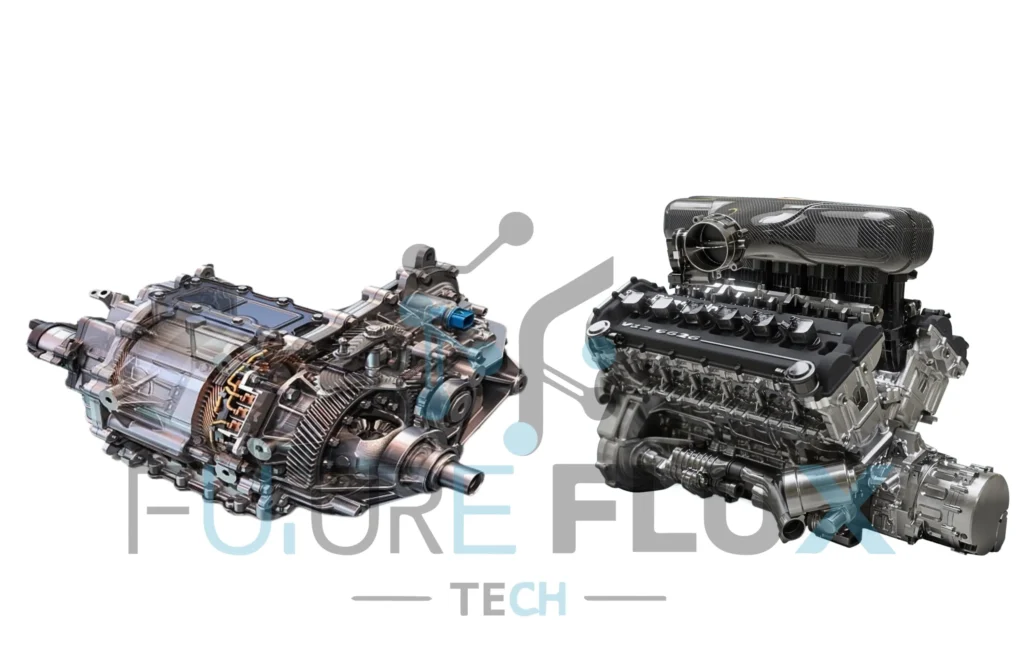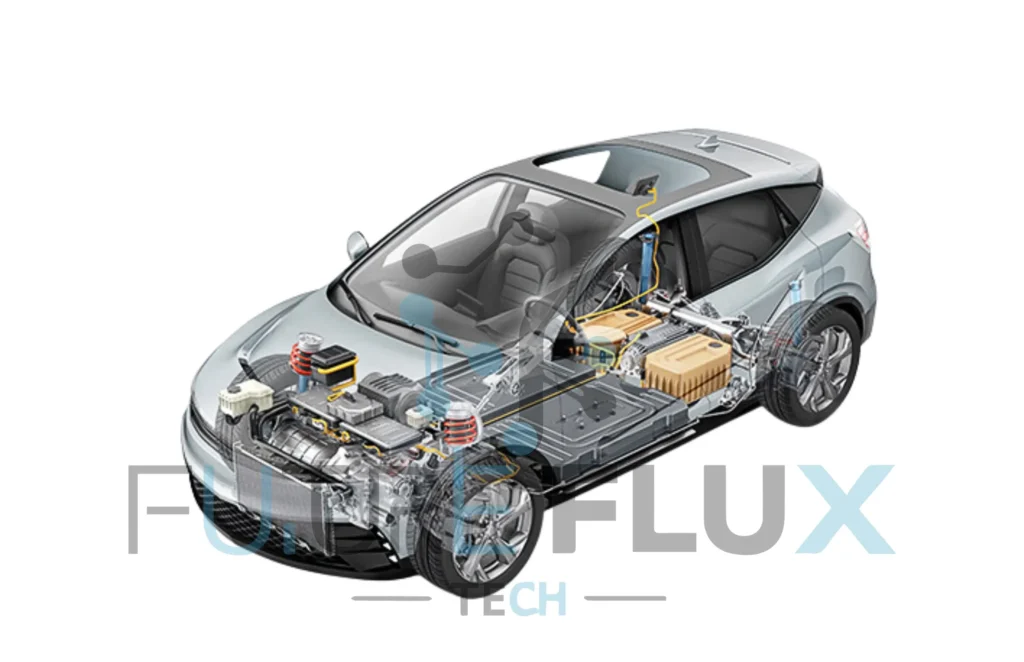The rivalry between battery-powered EVs and ICE vehicles has yet to end. Both cars are competing for the first spot. This years-long competition brought Hybrid EVs into existence. Do electric cars have engines and batteries all in one place? Hybrid EVs use combustion engines as their main driving force. Their batteries are merely backups for longer travels. Moreover, they do not charge through chargers. HEV batteries use regenerative braking to charge themselves. There’s more to Electric cars than luxury and performance. Each year, they get closer to a sustainable future.
Do Electric Cars have engines and batteries?
Electric vehicles are of different types. There are all-electric EVs that depend on batteries only. Then we have FCEVs having a fuel cell that converts hydrogen into electricity. Their type determines how electric cars work. People often confuse plug-in hybrids with hybrid EVs. However, I can’t blame them considering how similar these two vehicles are. Let’s analyze the components of a PHEV and an HEV.
1- Plug-in hybrid electric vehicles
First, we have the pinnacle of advanced EV technology, the PHEVs. They are arguably the best EVs concerning reliability and performance. They use engines, have rechargeable batteries, and are energy efficient. Plug-in hybrids offer better fuel economy than other EVs. The advanced EV technology allows PHEVs to start as regular electric cars. Once, the battery reaches its limits, the vehicle automatically shifts to engine mode.
2- Hybrid electric vehicles
Unlike PHEVs, Hybrid electric cars rely on their engine more than the battery. They can be refilled like gas cars since their engines rely on fuel to work. Their batteries are not rechargeable through an external charger. The Electric vehicle engine drives the car at higher speeds. Moreover, they have an electric motor that receives electricity from the batteries. The vehicle moves thanks to the collaborative effort between its engine and the motor.
EV Motors vs. Combustion Engines

Which works better? A motor or an engine? Both drive their respective vehicles to their respective destinations. The Electric motor vs engine comparison differentiates the two based on their chemistry and construction. Let’s not forget their purpose while discussing their differences. An electric motor collects electricity from the batteries which initiates Electric vehicle propulsion. Likewise, combustion engines ignite the fuel-air mixture which causes combustion and generates thermal energy. The gears in the powertrain then accelerate the car forward. Now, what differentiates a motor from an engine? An EV motor has a lower initial cost than combustion engines. These EV engines have fewer moving parts than IC engines contributing to their reduced cost. What’s more, no weekly oil change or regular maintenance. Furthermore, their regenerative braking reduces brake wear cutting down additional costs. Electric vehicles are more energy efficient than ICE vehicles. Besides Sustainability in transportation, they also reduce energy wastage.
Are Hybrid EVs better than BEVs?
So far, batteries are winning the race. However, they also have some limitations. The best examples of engine vs. battery comparison are HEVs and BEVs. These EVs are sustainable yet one of them uses an engine. Moreover, they are so alike yet so different. Here’s a comparison between the two Electric cars based on their performance and other features.
1- Fuel economy
Thanks to their efficient batteries, hybrid EVs use less fuel compared to gas cars. However, BEVs offer more fuel efficiency since they rely completely on their batteries. Both EVs are energy efficient in their own ways. An average Electric vehicle engine delivers 35 to 45 mpg of fuel economy. Moreover, a BEV converts 77% of electricity to movement including regenerative braking.
2- Driving range
HEVs have longer ranges than BEVs. The reason is simple, they do not rely completely on their batteries. BEVs can win the ‘no-emissions’ category, however, their batteries are not strong enough to take you to longer distances. Additionally, the driving range also depends on how do electric cars work. If your car is hybrid it will quickly switch to gas once the batteries drain out but the BEVs may get you stuck in the middle of nowhere.
3- Charging costs
One of the best Benefits of electric cars is their lower charging costs. Gas prices may fluctuate every now and then but electricity remains cheaper. The charging costs depend on your state’s tax laws and electricity costs. Hybrid EVs charge through regenerative braking and EV engines compared to gas cars. Typically, an electric car costs around $0.05 to $0.10 for a full charge. Charging your BEVs is easier than HEVs since you can charge them in the comfort of your home.
4- Battery costs
EV batteries are generally long-lasting and stay in good shape for over 10 years. However, they are not resistant to damage. In case of severe incidents, the battery must be replaced which may hurt your pocket a bit. The estimated battery replacement cost for HEVs is around $2000 to $8000. Moreover, battery electric cars may cost you around $5000 to a whopping $20,000 for battery replacement. Most companies offer strong warranties that cover most of the replacement costs.
5- Maintenance
Both BEVs and hybrid EVs have low maintenance costs. However, hybrid EVs have engines that have multiple parts. They are constantly working more than the batteries. Moreover, the Electric vehicle engine requires frequent oil changes which increases their maintenance cost significantly. BEVs are budget-friendly to maintain thanks to their all-electric batteries that last 9 to 10 years.
6- Sustainability
BEVs are more eco-friendly than HEVs. They produce zero tailpipe emissions which resonates with EVs’ main purpose. However, people still prefer hybrids because of their longer driving ranges. They are more eco-friendly than conventional gas cars. Less fuel consumption and more electricity usage. BEVs offer Sustainability in transportation and better air quality.
What makes Hybrid Electric Vehicles sustainable?

Hybrid EVs are still under fire for their less eco-stability, however, things are not as black and white as they seem. Indeed, they rely on engines for longer travels but their batteries also offer extra power. This power reduces the need for a large engine, decreasing their carbon footprint. Mild Hybrid EV engines stop once the vehicles are at rest. This reduces excess emissions and improves fuel economy. Moreover, Full Hybrid EVs have larger batteries with enough charge to travel short distances at low speeds. Their motors are also quite efficient reducing the need for a large engine. Future EV technology may release more sustainable hybrids that offer longer ranges while fulfilling their purpose.
Conclusion
EVs have always been a hot topic in America. They are eco-compatible, more efficient, and offer better fuel economy than gas cars. Their batteries are the pinnacle of modern automotive technology since they produce zero emissions. However, they cannot cover long distances on a single charge. Unlike gas cars, EVs rely on electric motors that convert electricity into kinetic energy. Do electric cars have engines and batteries? EVs have always been praised for their efficient batteries but adding an engine increases their driving range. Hybrid EVs and Plug-in hybrid EVs have engines and batteries to enhance their performance. This reduces their sustainability significantly, however, people prefer them over BEVs.
Are EVs heavier than gas cars? What makes FCEVs eco-friendly? Find out more on our blog site.
I’m Waqas, an electric vehicle enthusiast and tech writer with over 6 years of experience covering the EV industry. I write in-depth articles, comparisons, and reviews to help readers understand the fast-evolving world of electric mobility. From battery technology to EV launches and charging trends, I aim to make complex EV topics simple, engaging, and informative for everyday drivers and curious readers alike.





